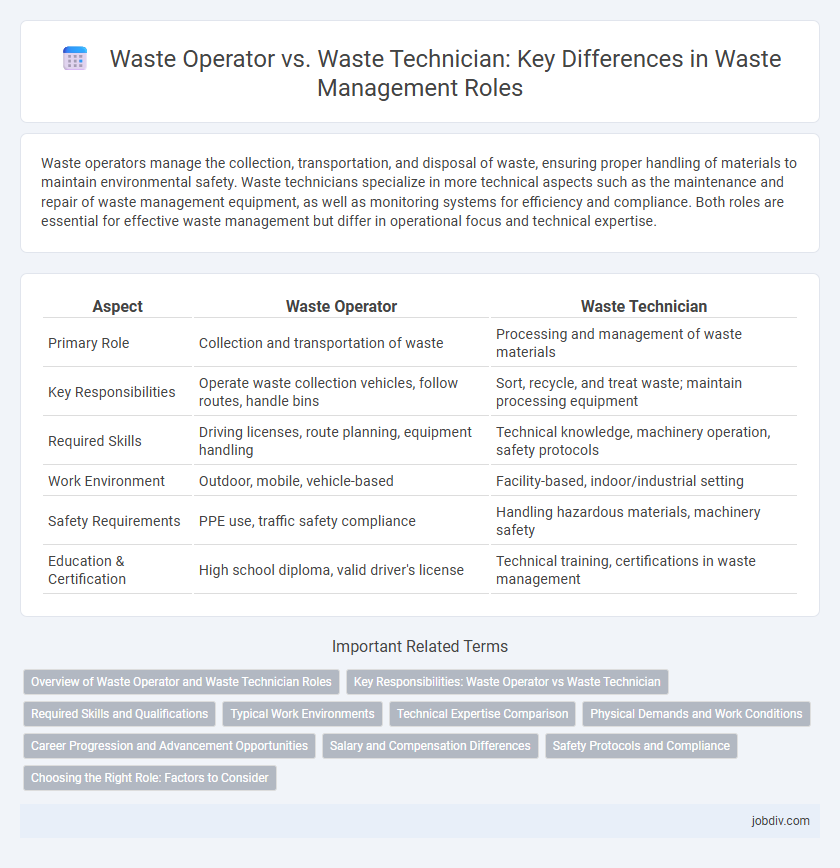Waste operators manage the collection, transportation, and disposal of waste, ensuring proper handling of materials to maintain environmental safety. Waste technicians specialize in more technical aspects such as the maintenance and repair of waste management equipment, as well as monitoring systems for efficiency and compliance. Both roles are essential for effective waste management but differ in operational focus and technical expertise.
Table of Comparison
| Aspect | Waste Operator | Waste Technician |
|---|---|---|
| Primary Role | Collection and transportation of waste | Processing and management of waste materials |
| Key Responsibilities | Operate waste collection vehicles, follow routes, handle bins | Sort, recycle, and treat waste; maintain processing equipment |
| Required Skills | Driving licenses, route planning, equipment handling | Technical knowledge, machinery operation, safety protocols |
| Work Environment | Outdoor, mobile, vehicle-based | Facility-based, indoor/industrial setting |
| Safety Requirements | PPE use, traffic safety compliance | Handling hazardous materials, machinery safety |
| Education & Certification | High school diploma, valid driver's license | Technical training, certifications in waste management |
Overview of Waste Operator and Waste Technician Roles
Waste operators manage the collection, transportation, and disposal of waste, ensuring compliance with environmental regulations and maintaining operational equipment. Waste technicians specialize in analyzing waste composition, conducting inspections, and implementing waste processing techniques to optimize recycling and reduce environmental impact. Both roles are essential in waste management systems, with operators focusing on logistics and technicians on technical and environmental aspects.
Key Responsibilities: Waste Operator vs Waste Technician
Waste Operators primarily manage the collection, transportation, and disposal of waste materials, ensuring compliance with safety regulations and environmental standards. Waste Technicians focus on the technical aspects, including operating and maintaining waste processing equipment, monitoring waste treatment processes, and conducting quality control tests. Both roles require knowledge of waste management protocols, but Operators emphasize logistical execution while Technicians concentrate on technical operations and system maintenance.
Required Skills and Qualifications
Waste Operators require practical skills in equipment handling, knowledge of safety protocols, and basic maintenance abilities, often needing a high school diploma or equivalent. Waste Technicians demand more advanced qualifications, including technical certifications or associate degrees in environmental science or waste management, alongside competencies in waste analysis, regulatory compliance, and equipment troubleshooting. Both roles prioritize attention to detail and adherence to environmental regulations, but Technicians typically engage in specialized tasks requiring deeper technical expertise.
Typical Work Environments
Waste Operators typically work in outdoor environments such as landfill sites, recycling centers, and waste transfer stations, where they operate heavy machinery and vehicles for waste collection and disposal. Waste Technicians generally work in more controlled settings like laboratories or recycling facilities, conducting waste analysis, sorting, and ensuring compliance with environmental regulations. Both roles require adherence to safety protocols but differ significantly in their physical work settings and operational responsibilities.
Technical Expertise Comparison
Waste Operators primarily manage the operation and maintenance of waste processing equipment, ensuring efficient collection and disposal workflows. Waste Technicians possess advanced technical knowledge in diagnosing, repairing, and optimizing complex waste treatment systems using specialized tools and software. Their technical expertise distinguishes Waste Technicians as crucial for system troubleshooting and performance enhancement in waste management facilities.
Physical Demands and Work Conditions
Waste operators often perform physically demanding tasks such as lifting heavy containers, operating machinery, and working in outdoor environments exposed to varying weather conditions. Waste technicians typically face similar physical challenges but may also require precision handling of diagnostic tools and equipment in both field and indoor settings. Both roles necessitate adherence to safety protocols to manage exposure to hazardous materials and ensure ergonomic practices.
Career Progression and Advancement Opportunities
Waste operators primarily handle the collection and transportation of waste materials, gaining foundational experience in waste management operations. Waste technicians often have more specialized skills, including equipment maintenance and waste processing, which open doors to supervisory or technical specialist roles. Career progression typically moves from operator roles to technician positions, with advancement opportunities expanding into management, environmental compliance, or recycling program coordination.
Salary and Compensation Differences
Waste Operators typically earn a median salary ranging from $35,000 to $45,000 annually, reflecting entry to mid-level responsibilities in waste management. Waste Technicians, possessing specialized skills in handling hazardous materials and advanced equipment, command higher compensation, with average salaries between $45,000 and $60,000 per year. Variations in pay are influenced by factors such as geographic location, certifications, and the complexity of waste processing duties.
Safety Protocols and Compliance
Waste Operators and Waste Technicians both play critical roles in managing waste safely, with Waste Operators primarily responsible for the operation of waste collection vehicles and adherence to safety protocols during transportation. Waste Technicians focus on monitoring, testing, and maintaining equipment to ensure compliance with environmental regulations and safety standards. Both roles require rigorous training in hazardous material handling, use of personal protective equipment (PPE), and strict adherence to Occupational Safety and Health Administration (OSHA) guidelines to minimize risks and ensure regulatory compliance.
Choosing the Right Role: Factors to Consider
Choosing the right role between a Waste Operator and a Waste Technician depends on skill requirements, responsibilities, and career goals. Waste Operators primarily handle machinery operation and waste collection, requiring physical endurance and basic technical knowledge, while Waste Technicians focus on equipment maintenance, troubleshooting, and compliance with environmental regulations, demanding advanced technical skills and certifications. Consider factors such as hands-on machinery work versus technical problem-solving, potential for career advancement, and interest in environmental safety when making a decision.
Waste Operator vs Waste Technician Infographic

 jobdiv.com
jobdiv.com